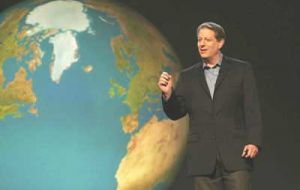MercoPress. South Atlantic News Agency
Argentina confronts Latin American biofuels craze
 Demonstrators on bicycles and wearing surgical masks chanted slogans against multinational agribusinesses during Al Gore speech
Demonstrators on bicycles and wearing surgical masks chanted slogans against multinational agribusinesses during Al Gore speech Former U.S. Vice President Al Gore warned that the drive to produce alternative fuels to combat global warming must not create new forms of environmental damage.
"Every potential solution much be handled carefully and the danger with biofuels is that extremely valuable forests will be destroyed unnecessarily," said Gore, whose global warming documentary "An Inconvenient Truth"won an Academy Award this year. "Another danger is that, if it is not pursued carefully, it will drive food prices up," Gore said on Friday to a private gathering of biofuel industry players inside a Buenos Aires hotel. U.S. President George W. Bush wants to slash gasoline consumption by 20 percent by 2017, a move requiring 35 billion gallons (132.5 billion liters) of alternative fuels to replace fossil fuels. But South American skeptics worry that diverting farmland for biofuels made from corn, sugarcane, palm oil and other agricultural products will harm the environment and worsen already troublesome inflation in the developing world. As Gore spoke, outside the hotel demonstrators on bicycles and wearing surgical masks chanted slogans against multinational agribusinesses, saying the biofuel boom will cause deforestation and turn arable land into deserts. Gore acknowledged this divide in his speech, but insisted that renewable energy is the future. "If it is produced in a careful way, the strategy of producing more biofuels can be part of the solution for the climate crisis without causing damage to the environment," he said. Through tax incentives and government mandates, Argentina wants 5 percent of its fuel supply be biodiesel or ethanol-based in three years. But a quarter of Argentina's 38 million people remain in poverty five years after an economic crisis, and the middle classes are also squeezed by two years of double-digit inflation. Harvesting the forests and switching ranchland from beef to soybeans for biodiesel will drive up consumer prices even more, they fear. "Biofuels will bring big business here that will make the rich richer and only bring more hunger and misery to the poor," said Ramon Garcia, a farmer at the protests. "They want to buy up Argentine farmland to damage it and produce biofuels that they'll take back to the United States." U.N.-Energy, a consortium of 20 U.N. agencies and programs, said in a report this week that bioenergy represents an "extraordinary opportunity" to reduce greenhouse gas emissions, boost energy security and promote rural development. But it also warned that "rapid growth in liquid biofuel production will make substantial demands on the world's land and water resources" and could force food prices to rise, putting a strain on the poor. Replacing just 10 percent of the world's current petroleum use with biofuels would consume about 30 percent of all the grain, oilseed and sugar produced in the U.S., Canada, the European Union and Brazil, estimates Loek Boonkamp, who studies agricultural trade and markets for the Organization for Economic Cooperation and Development. The Inter-American Development Bank has allotted US$3 billion (€2.2 billion) in credit to Latin American biofuels projects, two-thirds of it for agricultural giant Brazil, said the bank's executive director, Hector Morales. Dynamotive, a Canadian biofuels developer, just announced plans to invest up to US$120 million (€88.7 million) in six plants in Argentina that would use lumber- and paper-industry waste to make biofuel. Another 13 different biodiesel projects in Argentina were announced last year with investments of US$285 million (€210 million), regional group Abeceb Consultancy said. Gore flew later Friday to neighboring Chile where he told several hundred businessmen, politicians and activists at a climate seminar that global warming is "the most serious challenge our civilization has faced." "We can change this," he said, "This is not a political issue, this is a moral issue, a spiritual issue.




Top Comments
Disclaimer & comment rulesCommenting for this story is now closed.
If you have a Facebook account, become a fan and comment on our Facebook Page!